
Gradius V
Konami/Treasure 2004
Director: Hiroshi Iuchi
Producer: Yasushi Takano
Music: Hitoshi Sakimoto
Japanese Version Reviewed
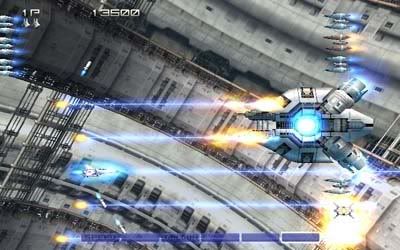
The name Treasure is one that regularly invokes debate, guaranteeing their notoriety. Regardless of your stance, most agree that thirteen years of Treasure has undeniably impacted gaming for the better.
Titles like Sin and Punishment, Gunstar Heroes, Hajime no Ippo and Bangai-O are unique and notable examples of their diverse coding expertise, and their support for two dimensional gaming has seen them win a legion of devoted fans.
It’s as true in gaming as it is in movies that, regardless of the results, marrying together two lucrative sources is a highly intriguing prospect. Capcom teamed with SNK, Namco took on Starfox and Sega’s Toshihiro Nagoshi created the zenith in the series with F-Zero GX.
When it was announced that Treasure were to develop Gradius V, the implications had hardcore gaming circles in a frenzy. For the first time since they jumped ship in 1992, Konami’s most famous ex-staff were about to be re-united with their old masters.
Although Gradius V was much lauded critically, it was never to be a massive commercial success outside of its native Japan, rather destined to take its place in the hall reserved for unappreciated masterpieces. If history has taught us anything, it’s that the general consumer base can’t be relied on for taste. Gradius V is an utterly brilliant piece of work. It drags the horizontal shoot-em-up away from stale formulaic templates and revitalises the entire genre by being boldly and beautifully cinematic. It revels in its production values, and, as was so expertly achieved in Radiant Silvergun, is a feat of dazzling magnitude.
At heart the Gradius format remains largely unchanged. The tweaks, although slight, are a welcome evolution. A death no longer sends you back to a restart point, and, rather than being completely stripped of your weaponry, you can grab back the ‘options’ that surround your craft. To some this may seem like a cardinal sin, as the severe penalty for mistakes in Gradius is its trademark - but to everyone else it will feel like a breath of fresh air.
The production itself is the real spectacle, however. In terms of game design, Director Hiroshi Iuchi, responsible for all of Treasure’s most significant shoot-em-ups, has, under the influence of Konami, shed some of the stuffiness that make his other productions so gruelling. Treasure rarely bow to modern gaming standards, but Gradius V has a broader level of accessibility than most of Iuchi’s previous titles.
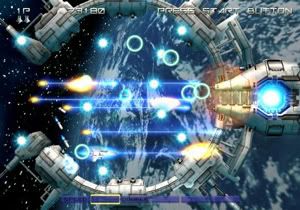
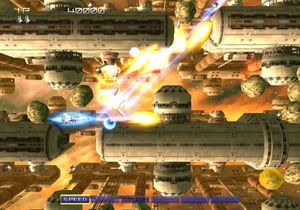
Players can look forward to a game in which each new stage is identifiably unique, failing to conform to any set length or pattern.
After a spectacular first boss battle high above the Earth, stage two sees player character Vic Viper encounter a future version of himself on the approach to a giant Bacterion mothership. The two pilots shake off the conundrum over the radio, and decide to work together, blasting their way in. They fight through a network of enemy filled corridors to the heart of the ship, before rushing down an escape tunnel as the destroyed core goes critical. The deep space climax then pits you in an unrelenting encounter against an armada of bosses.
The graphics are faultless, encompassing the clean style of Ikaruga while expanding with far more detail and atmosphere. There are no Easter Island statues, no in-jokes, and no hidden barking dogs to collect. Instead the game is punctuated with rust coloured industrial complexes, derelict space stations and meteor filled outposts. Vic Viper’s fight against the Bacterion hordes has never been taken so seriously, and as such this Gradius feels more raw and adult than any previous instalment.
Iuchi’s production is one of purity, in which all key facets of design complement each other in perfect moderation. The glue that binds the experience together, that elevates every moment of excitement and exhilaration, is the soundtrack. Hitoshi Sakimoto is one of the most accomplished composers in the industry, having worked on titles such as Radiant Silvergun and Final Fantasy amongst others, before founding Basiscape, Japan's premier videogame music production company. Gradius V is arguably his finest work, remixing the series classic themes with swelling new orchestral compositions that set the pulse pounding and the heart soaring. It's an awesome mixture of slow, spacey intro’s that ebb and flow into driving beats and dramatic climaxes. The opening to stage three, in which Vic Viper descends into a dense, futuristic city peppered with light and electric neon tributaries, is one of the most impressive in the game. A science fiction dream, the cold blue metropolis is brought to life with euphoric synth chords, orchestral instruments and thundering drumbeats.
Not only is the soundtrack the game's defining element, but one of the most important in gaming history – not just because of its sheer brilliance, but because it illustrates how music can transport an age old genre into the realms of modern cinematic immersion. Be sure to turn that volume right up.
Debate aside, Treasure - love them or hate them - have proven that collaboration can exceed expectation. In this case, they returned to Konami to demonstrate an artistry of game design that the company had all but forgotten.
Gradius V is a masterpiece, an exercise in the re-defining of a series and a genre in a careful, measured form.
The hall of unappreciated masterpieces is a little dark and could use some dusting, but the rarely trodden carpet is still thick and the walls still white beneath the cobwebs. Gradius V sits there on its podium, quiet and unassuming. On occasion a visitor will come to the hall, peering curiously at the plaques on the wall, their footsteps inaudible save for the occasional floorboard creak. When they pick up and play Gradius V they’ll realise that there is a commonality in the hall of unappreciated masterpieces, and that’s that, like the limbo of the hall itself, games here are ageless. Regardless of popularity, that’s the prize for true success.
A we’re not worthy Nine out of Ten
Sources of information and many thanks to:
Wikipedia.com
How's my reviewing?
Drop me a PM and let me know!
Want to try the game out for yourself?:
Gradius V is available in all regions on the Playstation 2, and can be picked up for as little as £15/$25
 G5 ADDENDUM:TRIVIA
G5 ADDENDUM:TRIVIA- Gradius V is the first title in the series to be developed by a source other than Konami
- It's the first, and currently only game in the series to feature a full two-player simultaneous mode
- In the 2006 French documentary film Japon: Histoire Du Shooting Game produced by CanalSat's GameOne channel, senior Konami producer Osamu Kasai explained that the reason the game was outsourced was due to limited resources
- Composer Sakimoto also wrote the score for famous Raizing shoot-em-up, Armed Police Batrider
- All Japanese pre-orders for the game included a bonus DVD called OPTIONS, and contained interviews with the development staff, art galleries and a collection of "super play" videos.
- All original first run copies of Gradius V in Japan came with an official History of Vic Viper booklet, featuring a full lowdown, illustrations and schematics on Konami's most famous shmup ship
- Japanese gaming magazine Famitsu scored Gradius V 32 out of 40 on its release
- If you pre-ordered a copy Gradius V in the USA from the Gamestop store retailer, you could pick up a special USA version Gradius V DVD on the day of release. ^_~
- Another DVD featuring a wealth of additional content was put together and released for commercial purposes. This is known as Gradius V Official DVD The Perfect
Gradius V Official DVD The Perfect

San Jose 2004 Classic Gaming Expo ^_~
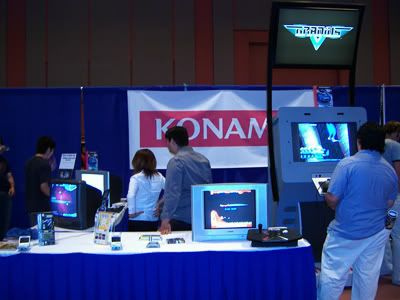
Lock the shop early, Gradius V is out!
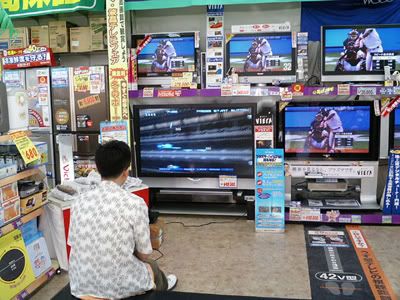
Poster artwork
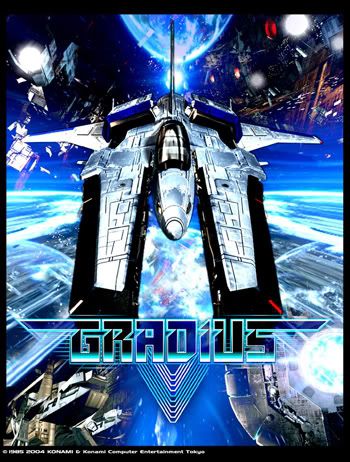
^_~ = PC Engine Fan (thanks for the additional trivia input.)